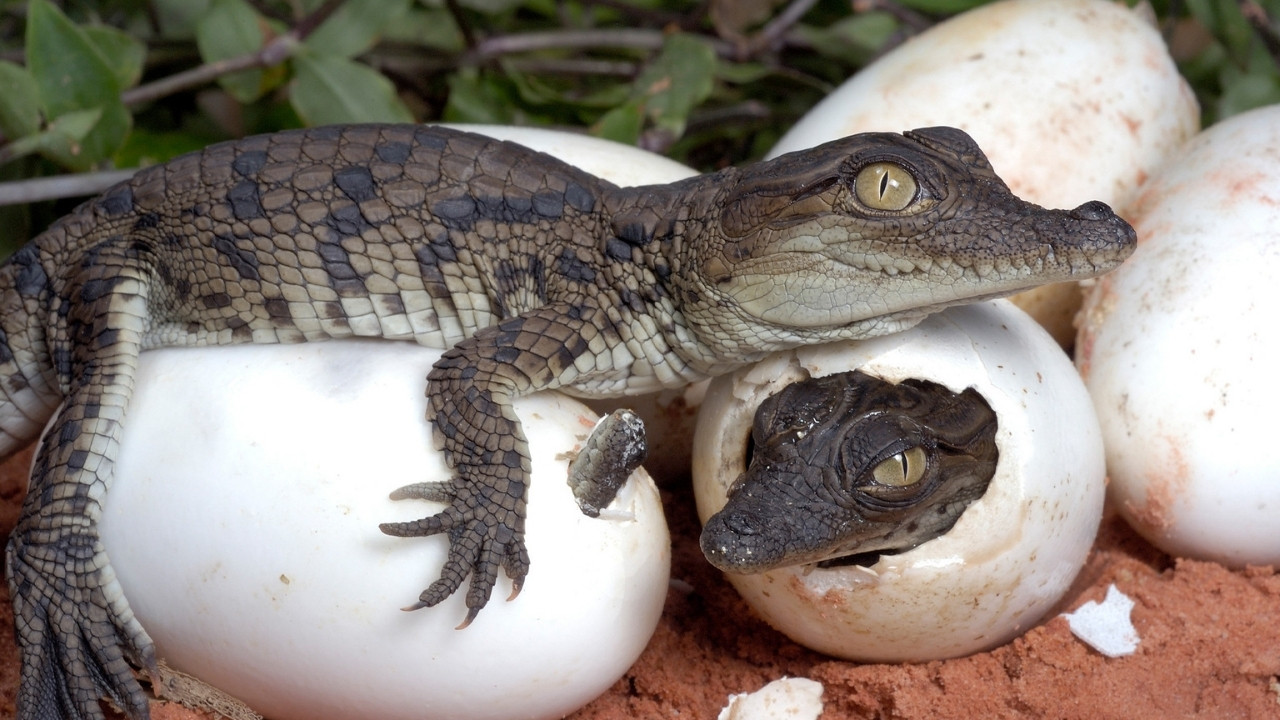
Did you know crocodiles can have virgin births? Yes, you read that right! Female crocodiles can reproduce without a male, a phenomenon known as parthenogenesis. This rare event has fascinated scientists and animal lovers alike. Imagine a crocodile laying eggs that hatch into baby crocs without any male involvement. Parthenogenesis isn't just a crocodile thing; it occurs in other reptiles, birds, and even some fish. But why does it happen? How does it work? And what does it mean for crocodile populations? Let's dive into 35 intriguing facts about this incredible natural wonder. Get ready to be amazed by the secrets of crocodile virgin births!
Key Takeaways:
- Crocodile virgin birth, or parthenogenesis, is a rare form of reproduction where females can produce offspring without males. This phenomenon has been observed in over 80 vertebrate species, including crocodiles.
- Parthenogenesis in crocodiles has genetic implications, environmental triggers, and potential for conservation. Ongoing research aims to uncover more about this fascinating reproductive process and its implications for the animal kingdom.
Crocodile Virgin Birth: An Astonishing Phenomenon
Crocodile virgin birth, also known as parthenogenesis, is a rare and fascinating occurrence in the animal kingdom. This phenomenon has intrigued scientists and nature enthusiasts alike. Let's dive into some incredible facts about this unique reproductive process.
What is Parthenogenesis?
Parthenogenesis is a form of asexual reproduction where an egg develops into an embryo without fertilization by a male. This process is quite rare in vertebrates but has been observed in some reptiles, including crocodiles.
- Parthenogenesis comes from Greek words meaning "virgin creation."
- This process allows females to reproduce without males.
- It has been documented in over 80 vertebrate species.
- Parthenogenesis can occur naturally or be induced in a laboratory setting.
How Does Parthenogenesis Occur in Crocodiles?
Understanding how parthenogenesis happens in crocodiles can shed light on this extraordinary process.
- Female crocodiles can produce eggs that develop into embryos without sperm.
- The eggs undergo a process called automixis, where they fuse with a polar body.
- This fusion mimics fertilization, allowing the egg to develop.
- The resulting offspring are usually female and genetically similar to the mother.
Historical Observations of Crocodile Virgin Birth
Instances of parthenogenesis in crocodiles have been recorded in various parts of the world. These observations provide valuable insights into the phenomenon.
- The first documented case of crocodile parthenogenesis was in 2015.
- This case involved a female American crocodile in a Costa Rican zoo.
- The crocodile had been isolated from males for over 16 years.
- The eggs produced were viable but did not hatch successfully.
Genetic Implications of Parthenogenesis
Parthenogenesis has significant genetic implications for the offspring and the species as a whole.
- Offspring produced through parthenogenesis have reduced genetic diversity.
- This lack of diversity can make them more susceptible to diseases.
- Parthenogenetic offspring are often clones of the mother.
- Genetic mutations can accumulate over generations of parthenogenesis.
Environmental Triggers for Parthenogenesis
Certain environmental factors can trigger parthenogenesis in crocodiles. Understanding these triggers can help explain why this phenomenon occurs.
- Stressful conditions can induce parthenogenesis in some reptiles.
- Isolation from males is a common trigger for parthenogenesis.
- Changes in temperature and habitat can also play a role.
- Parthenogenesis may be a survival strategy in challenging environments.
Parthenogenesis in Other Reptiles
Crocodiles are not the only reptiles capable of parthenogenesis. This phenomenon has been observed in various other reptilian species.
- Komodo dragons are known to reproduce through parthenogenesis.
- Some species of snakes, like the boa constrictor, can also reproduce this way.
- Parthenogenesis has been documented in certain lizard species.
- These occurrences highlight the adaptability of reptiles.
Scientific Research on Crocodile Parthenogenesis
Ongoing research aims to uncover more about the mechanisms and implications of parthenogenesis in crocodiles.
- Scientists are studying the genetic makeup of parthenogenetic offspring.
- Research is being conducted to understand the evolutionary advantages of parthenogenesis.
- Studies are exploring the potential for parthenogenesis in other crocodilian species.
- Findings could have implications for conservation efforts.
Conservation and Parthenogenesis
Parthenogenesis could play a role in the conservation of endangered crocodile species. This aspect of the phenomenon is of particular interest to conservationists.
- Parthenogenesis could help maintain populations in the absence of males.
- It may provide a temporary solution for critically endangered species.
- Conservation programs are considering the potential of parthenogenesis.
- Ethical considerations are being discussed in the context of conservation.
Future Prospects of Parthenogenesis Research
The future of parthenogenesis research holds exciting possibilities. Scientists are hopeful about the potential discoveries and applications.
- Advances in genetic technology could provide deeper insights.
- Understanding parthenogenesis could lead to breakthroughs in reproductive biology.
- Future research may uncover new species capable of parthenogenesis.
The Astonishing World of Crocodile Virgin Birth
Crocodile virgin births, or parthenogenesis, are a fascinating phenomenon. Female crocodiles can produce offspring without male fertilization. This rare event has been observed in captivity, shedding light on the reproductive capabilities of these ancient reptiles. Scientists believe this ability might be an evolutionary adaptation, allowing species survival in the absence of males.
Understanding parthenogenesis in crocodiles helps researchers learn more about reptilian biology and evolution. It also raises questions about the potential for similar occurrences in other species. While virgin births in crocodiles are rare, they remind us of nature's incredible adaptability.
So next time you think about crocodiles, remember their unique ability to reproduce without a mate. It's just one more reason these creatures continue to captivate scientists and nature enthusiasts alike. Nature never ceases to amaze with its endless surprises and mysteries.
Frequently Asked Questions
Was this page helpful?
Our commitment to delivering trustworthy and engaging content is at the heart of what we do. Each fact on our site is contributed by real users like you, bringing a wealth of diverse insights and information. To ensure the highest standards of accuracy and reliability, our dedicated editors meticulously review each submission. This process guarantees that the facts we share are not only fascinating but also credible. Trust in our commitment to quality and authenticity as you explore and learn with us.


